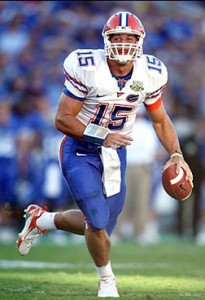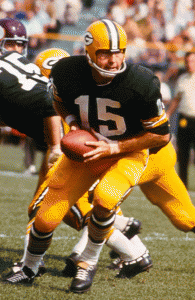Is Tim Tebow a Starr in the Making?

Despite winning two National Championships and a Heisman Trophy, many still question whether Tim Tebow is an NFL caliber quarterback.
Regardless of whether you are a fan of the Florida Gators, it is hard not to like and appreciate the drive and talent of their star quarterback, Tim Tebow. Yet, even as he enters his final season guiding the preseason national championship favorites, Tebow continues to have detractors that question whether he can be successful at the next level.
While there may be better college football players, Tebow epitomizes all that is positive about college athletics.
A solid student, he is the son of missionaries and has spent time participating in mission trips to the Philippines.
On the field, he plays the game with the type of passion and determination that hearkens back to days gone by.
In his three collegiate seasons, Florida’s number 15 has risen to a level where he is rightfully being compared to the all-time greats in college football history.
Tebow certainly has physical talents, but what makes him rise above the crowd is his ability to propel his entire team to another level. Only a few special players have ever been able to impose their personal will on a team the way Tebow did on the 2008 Gators.
When Tebow addressed the media after his team suffered a disappointing one-point defeat to the University of Mississippi that, at the time, seemed to derail their dream of playing for a national title, he didn’t make a guarantee in the fashion of Joe Namath’s Super Bowl III prediction.
Instead, he did something that went beyond Namath’s bold statement. By promising that no player or team would work harder than he and his teammates, Tebow lifted his entire team to a higher level.
As they say, the rest is history. The Gators didn’t just merely win the rest of their games they outscored their final eight regular season opponents by an average score of 52-12, winning each game by at least 28 points. In both the Southeastern Conference Championship Game and the Bowl Championship Series Title Game, they found a higher gear in the second half to turn close games into double-digit victories.
It is interesting that at a time when such a premium is put on winning, many are ready to ignore the obvious influence that Tebow has on the performance of his team and predict that he would have limited success as a quarterback at the professional level. Some have gone as far as saying that his best choice would be to convert to fullback or some other position where his athleticism could be utilized.
Now recent history is laden with quarterbacks who led college teams to championships, and in some cases even claimed the Heisman Trophy, but who had little or no success in the NFL. Players such as Tommie Frazier, Gino Torretta, Chris Weinke, Danny Wuerffel, Tony Rice and Eric Crouch made their college teams champions, but were unable to transfer that success to the next level.
But to even consider lumping Tebow into that category is to woefully sell short his talent and desire for personal and team success. Unless Tebow somehow ends up in a system and with a coach that are unable to capitalize on his running ability and athleticism, I have little doubt that Tebow will be a winner in the NFL.
In fact, as I watched Tebow and the Gators meticulously make big play after big play during key drives in the 2009 BCS title game, it reminded me of another famous number 15 who also played quarterback in the SEC and then overcame doubters to set the standard for championship success in the NFL.
Drafted in the 17th round of the 1956 NFL Draft after leading the University of Alabama through an uncharacteristically poor (0-10) 1955 season, few could have predicted that Bart Starr would eventually lead his team to a record five NFL Championships as well as victories in the first two Super Bowls.
Like Tebow, Starr didn’t have the prototype big arm that many believe is a necessity in the NFL. However, also like Tebow, Starr possessed a desire and dedication that helped him become the field general for the great Packer teams of the 1960s.

After being drafted in the 17th round, Bart Starr led the Green Bay Packers to five NFL Championships.
After toiling through three losing seasons with the Green Bay Packers, Starr’s career turned the corner in 1959 with the addition of head coach Vince Lombardi.
Generally soft-spoken, few believed that Starr would fit with the fiery Lombardi. However, what soon became apparent was that Starr, who like Tebow looked and acted like a choirboy off the field, possessed the iron will of a cold-blooded killer once he stepped on the gridiron.
In an era when quarterbacks called their own plays, Starr was known for making the big play at the pivotal moment of the game. In Super Bowl I, Starr turned what had been a close game in the first half into a blowout by eating away time with meticulous drives during the crucial second half.
The pinnacle moment of Starr’s career occurred a year later when he battled the elements and the Dallas Cowboys in the final moments of the famous “Ice Bowl.”
Trailing 17-14 and with their chances for an unprecedented third straight NFL Championship slipping away, Starr led the Packers on a late game drive that left them facing a third down play at the Cowboy’s one-yard line with only 16 seconds left in the game.
Though Starr’s career total of 15 rushing touchdowns is minuscule compared to the numbers Tebow has compiled running the football at Florida, on the biggest play of his career Starr called for a quarterback sneak then plowed over his right guard and into the end zone.
Rather than dismissing Tebow because he doesn’t possess the exact body or arm strength that most scouts think is a prerequisite for playing in the NFL, personnel directors need to remember that there is more to success in the NFL than possessing certain physical attributes.
The number of first round NFL draft picks who met the scout’s idea of a perfect quarterback, yet failed miserably on the field, is even longer than the list of college champions who fell short. And remember, in addition to Starr, three other great championship quarterbacks, Johnny Unitas, Joe Montana and Tom Brady were thought to not have what it takes to succeed in the league.
After retiring, Bart Starr had a stint as head coach of the Packers, but was never able to find another Bart Starr to lead the team. Of course, he also couldn’t find another Willie Davis, Ray Nitschke, Jim Taylor, Paul Hornung or Herb Adderley and eventually left the team with a losing record.
You can bet that if Starr were still coaching today, he would quickly jump at the opportunity to coach his fellow number 15. But it is probably a good thing that Starr is retired because combining football’s two choirboy assassins would certainly be deadly for the opposition.
Hello, i feel that i saw you visited my weblog so i got here to return the
want?.I’m trying to find things to enhance my site!I suppose its ok to make use of a few of your ideas!!